The Grapevine Art & Soul Salon
VIEWS AND REVIEWS
Barbara Knott: A Review of Rosemary Daniell's The Murderous Sky: Poems of Madness and Mercy
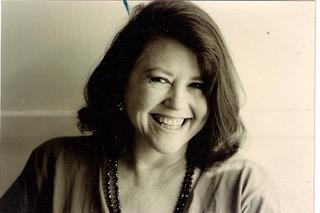
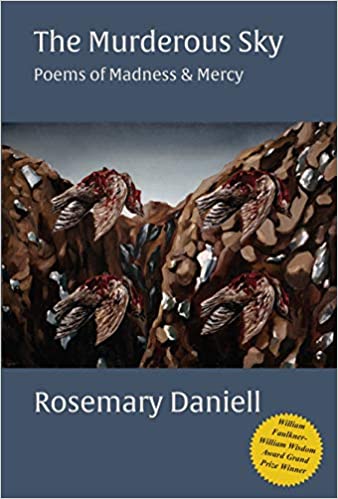
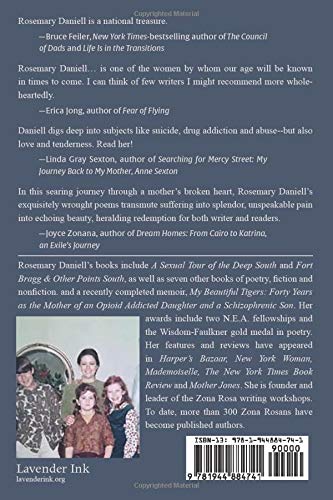
As one who has been mentored for many years off and on by Rosemary Daniell through membership in one of her Zona Rosa writing groups, as well as one of over 300 Zona Rosans who have published books, I have been reading her recent publication with great interest. I knew something about her life, knew of the hardships, but was taken into her world far more deeply in these poems. The way she brings art and soul together is a powerful subject for exploration in The Grapevine.
The Murderous Sky is a many-faceted look at a mother's complex experience as she tries to raise two talented children whose lives become subject to "murderous" influences. The book's title is a highly charged challenge to read at your own risk. A sky is murderous? Poems about madness and mercy? Even the title of this collection of poems shocks the reader into heartfelt reactions that may lead to considering anew what it means to be human and to realizing that heartbreak is an essential human experience.
What does she mean by "murderous" sky? On the book cover is a painting by Rene Magritte called Le Ciel Meurtrier which features an image of a bird, heavy like an eagle or vulture floating upside down. The image is repeated to make four birds stamped inside what looks like a harshly shadowed canyon or mountainside, above which a cloud-troubled sky is visible. Darkly perceived blood flowing from the breast of the bird definitely sets a murderous tone for the picture and suggests the tone of the book as well.
Inside, Daniell gives us poem after poem about madness generating significant moments of mercy. Her consistent subject is heartbreak, yet each poem is far from repetitive. In these poems we are looking into the heart of a mother responding to the madness of a daughter who creates beautiful paintings and is undermined by drug addiction, as well as a schizophrenic son who writes compelling poems and acts out his schizophrenia in ways harmful mainly to himself. As they grow up, each provides pain and grief enough to fill the mother's life with heartbreak. The mother intervenes, suffers, and loves without leaving. She does not allow their sickness to destroy her, and though she does not save them, she bestows a kind of saving grace on their lives.
Synchronistically, my extensive reading in the work of poet David Whyte led me recently to his book Consolations, subtitled The Solace, Nourishment and Underlying Meaning of Everyday Words. Heartbreak is one of them: there is almost no path a human being can follow that does not lead to heartbreak (p.103). What I have read by Whyte about heartbreak came back to me while reading Rosemary Daniell's poems, and I felt immediately how it added rich context to her poetry.
For example, Whyte asserts that heartbreak is unpreventable; the natural outcome of caring for people and things over which we have no control. He goes on,
Heartbreak begins the moment we are asked to let go but cannot, in other words, it colors and inhabits and magnifies each and every day; heartbreak is not a visitation, but a path that human beings follow through even the most average life. Heartbreak is an indication of our sincerity: in a love relationship, in a life's work, in trying to learn a musical instrument, in the attempt to shape a better more generous self. (p. 101).
In the poem "Faith" Daniell speaks of "a woman crucified." The poet in her treats crucifixion as a common experience among humans, as it is, psychologically and poetically speaking. And yet she demonstrates that the pain of a broken heart may also bring, eventually, a certain kind of bliss. One might call it a resurrection. In the poem "Bliss" she asks, "Can rapture blaze where even this pain is?" Finding creativity among the shards of broken lives, the answer is "Yes." Ultimately, her grief becomes absorbed into her creativity, her heartrending poems about madness and mercy.
Those of us who write poetry rarely uncover such extended, exquisite pain, and readers more often turn to poems for reassurance that life is beautiful and that a positive outlook really is within reach. So it is truly fascinating to have this about-face look into poetry that features the fangs of fate so active and hurtful. Opening up to heartbreak under the influence of Daniell's poetry, especially when touched with Whyte's poetic philosophy, helps us to become aware that we are loosening our own heartfelt emotions about our own lives and letting those emotions find solace in our reading.
Whyte adds in his small essay: Heartbreak is how we mature; yet we use the word heartbreak as if it only occurs when things have gone wrong: an unrequited love, a shattered dream .... But heartbreak may be the very essence of being human, of being on the journey from here to there, and of coming to care deeply for what we find along the way.
Rosemary Daniell displays flame after flame of rapture in these painful but wonderfully wrought and brilliant poems of madness and mercy. Some of the many and varied images come from outside her main focus on daughter and son and recognize similar heartbreaking woes in other people's lives. Those who go on reading and likely rereading the artful, soulful, and thought-provoking poems may well become aware of hidden personal creative potentials released by one's own broken heart. Anyone reading the book is more than likely to be moved toward self awareness and a sense of mutuality with her.
One of the poems, "Sacred Things," received the William Faulkner award in poetry in 2009. The entire manuscript for The Murderous Sky received the William Faulkner award for best poetry collection in 2019, and this led to its publication. She reports that she had been working on the poems for this book for almost thirty years when it was published. The book is an astonishing achievement by a brilliant writer whose first name evokes not only flower and spice, but also Mary, who bore the pain of giving birth to the son of God and then suffering his crucifixion and resurrection. I believe these are her words, given (p.xv) unattributed (except to God) before the poems appear:
And God said: you will not have ordinary happiness.
But you will have this.
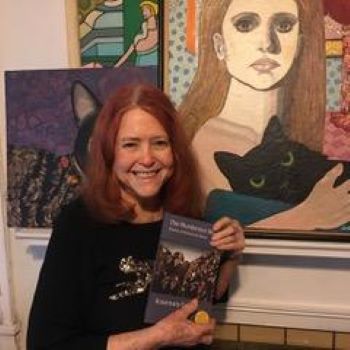
Rosemary Daniell, The Murderous Sky: Poems of Madness and Mercy (Lavender Ink, 2020).
David Whyte, Consolations (Langley, Washington: Many Rivers Press, 2018).
John O'Donohue, Anam Cara: A Book of Celtic Wisdom (New York: Harper Collins, 1997).
Barbara Knott: A Review of J. Allen Boone's Kinship With All Life
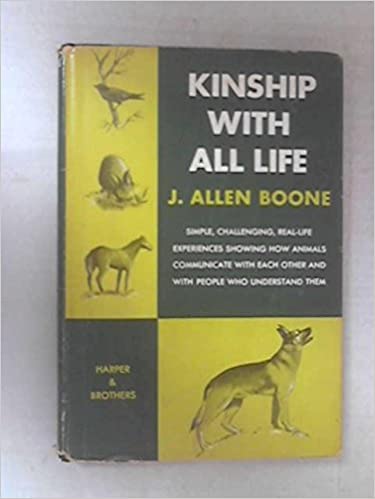
J. Allen Boone published Kinship with All Life in 1954, seven years before I met Dorothy Brett, the one who not only recommended the book to me but insisted that I read it as we became acquainted during the late 1960s and early 70s. Some background is in order, I think, because Dorothy Brett and D. H. Lawrence are both important figures in our Grapevine themes related to depth ecology.
In the summer of 1966, Charles and I were on a trip around the country in our new Mustang. We stopped in Taos because I wanted to visit the D. H. Lawrence ranch, established as a memorial earlier in the twentieth century, by his wife Frieda when he died in l930 at age 44. She, too, is buried there, along with the man she married after Lawrence died.
Dorothy Brett, artist, daughter of Viscount Escher in England, who had her first date with Winston Churchill, came to Taos with the Lawrences around 1922, ostensibly to set up a colony he wanted to call Rananim, of folks who would live close to the land, organically, with their environment. Lawrence had envisioned such a community in Florida until he changed his geographical focus when Mabel Dodge Luhan, heiress and supporter of the arts, called him to Taos and offered him a ranch, expressing the wish that he would write about her part of the world, the Taos Pueblo mountains where she settled when she married Tony Luhan, one of the Pueblo Indians.
When Charles and I arrived in Taos, we went to John Manchester's art gallery and through him met Dorothy Brett who was still very much alive in her eighties and a remarkably interesting person, especially to me. I was deeply moved by the fact that she had been literally in touch with my beloved DHL, about whom I was writing my master's thesis: D. H. Lawrence's Concept of Quickness. In Brett's excitement over my interest in Lawrence and his love of nature, soul and sensuality, she began to promote Kinship with All Life as a wonderful book about much of what I was talking about. We returned four years later for the D. H. Lawrence Festival in honor of the 40th anniversary of his death. This time we stayed in the La Fonda Hotel whose owner Saki Karavas had purchased Lawrence's paintings. He had them on display for the festival.
I still hadn't read the Boone book, though, and again had to deal with Brett's insistence. She knew how Lawrence had lived and had written with deep sensory (as well as sensual) interest in the environment and in the body that links us to elements, plants, and animals, and to each other. And she learned through a friend whom she described with boundless enthusiasm about the driving motif of Kinship with All Life: that it is possible for humans and other creatures to communicate far more profoundly than we imagine.
Finally, I located a copy and read it. The author J. Allen Boone was a filmmaker himself, but the book is about a period of time he took off to be the keeper of a dog about to become a great movie star: Strongheart, whose first film led to several others, including the famous White Fang, all made in the 1920s. Between films, the dog Strongheart lived with Boone, and they became equals in communication, with the dog revealing surprising capacities for complex and subtle thought and intention.
I love the opening of the book. The first line of the foreword is one that resonates still, for we could be reading about the present moment as well as about the mid-fifties of the previous century:
As we live through these kaleidoscopic days when confusion, distrust, conflict and misery are so common everywhere, it is revealing to note that more and more people are finding reassurance and peace of mind in companionship beyond the boundaries of humanity. They are making friends not only with such conventional favorites as dogs, horses, cats and birds, but with wild animals, snakes and insects.
Men and women everywhere are being made acutely aware of the fact that something essential to life and well being is flickering very low in the human species and threatening to go out entirely.
This "something" he mentions has to do with these and other like values: love, unselfishness, integrity, sincerity, loyalty to one's best, honesty, enthusiasm, humility, goodness, happiness, fun. He goes on: Practically every animal still has these assets in abundance and is eager to share them, given opportunity and encouragement (p. 7).
I am tempted to quote the whole book! That's why Brett was so insistent on my reading it. So I will follow her example instead and strongly recommend that you see if you can find a copy of J. Allen Boone's Kinship with All Life (New York: Harper and Row, 1954) and a tree to sit under while you read it (like Lawrence did when he was writing at his ranch in Taos) and become fully aware of your own environment. If you have a dog or cat to hang out with you, all the better. If not, look for a passing squirrel or deer to wave down if you can.
Here are some links to earlier reviews of books that are rich in discussion of our themes.
Barbara Knott: A Review of David Whyte's The House of Belonging
Barbara Knott: An Introduction to Michael Meade's Why the World Doesn't End: Tales of Renewal in Times of Loss
Charles Knott: An Introduction to James Hillman's The Force of Character and the Lasting Life
Copyright 2021, Barbara Knott. All Rights Reserved.